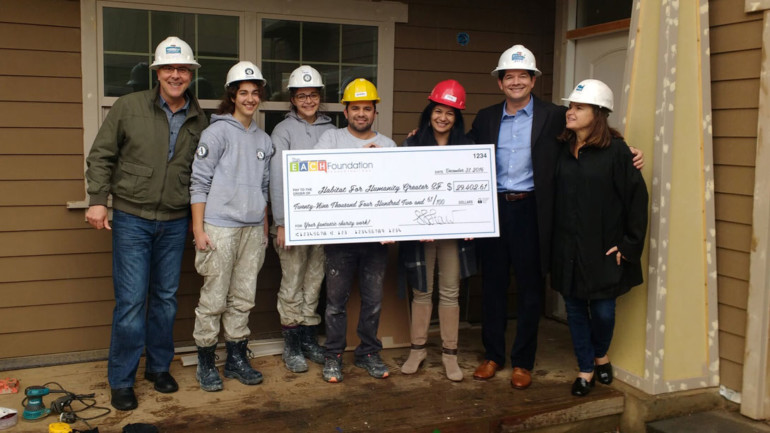Cáritas is not a word you see used in everyday English vernacular (it means “Charity,” in Latin). But it is the name of upstart San Francisco-based, Index-only, Exchange-Traded Fund (ETF) foundation-asset investment advisory firm Cáritas Advisors, which is working to make investments that have a lasting positive impact. The company gives up to 25% of its fee revenue to the charities of the clients’ choice, forging a unique investment approach that benefits the community.
Founder Lionel Shaw is a veteran financial advisor with an MBA and 23 years of wealth management experience. He coined the term “finanthropic” while volunteering for Habitat for Humanity, when hoping to figure out the best way to couple philanthropy with his financial services practice. “It made simple sense,” he says. “Link an investing model with a giving model and, voila, you have ‘finanthropy.’ So, I trademarked the word, and here we are.”
Cáritas, located at 50 California Street in San Francisco, strives for maximum transparency. Firstly, the company claims to charge the lowest fees in the business (0.10% – 0.40% on assets per year, all commissions and other transactions included), with a money-back guarantee. It utilizes only the most liquid, lowest cost ETFs in the industry. Shaw also employs a covered-call option derivative strategy for risk management and increased income, which bumps up fees a bit (0.15% per year, give or take), but those transaction fees go to Charles Schwab & Co. (the firm’s clearing and custody holding company), not to Cáritas. Secondly, a percentage of each investment gives back: 10% of the fees in year one go to the charity of the clients’ choice; in year two, 15%; year three 20%; and year four 25%. After that, 10% goes to charity on an on-going basis.
“When Wall Street espouses their ‘socially responsible,’ ‘environment, social, governance,’ or ‘impact investing’ advisory models, I think that they are mostly trying to gain traction with a sexy marketing scheme,” Shaw says. “This country is plenty regulated, so we tell our clients: ‘Let’s not regulate the regulators.’”
One fund the the company recommends is the ETF known by the symbol SHE, a gender-equality based exchange-traded fund, which is managed by State Street Global, and is a composite of all the best companies with women in the C-Suite. “Gender-equality is an important business tenet missing largely from corporate America still today," Shaw says. SHE is a basket of great names like Coca-Cola, Mastercard, and General Motors (whose CEO is Mary Barra, industry icon).
Shaw says that the best way to be socially responsible is to give to your local community 501(c)3 nonprofits. “We force our clients to think globally and act locally through our revenue giving plan,” he says. “We link up with The EACH Foundation, tapping into the resources of Foundation Source Philanthropic Services, Inc. (in Fairfield, CT, the largest foundation manager in the country; over $14 billion in assets), and direct our clients to one of EACH’s eight giving areas: environment, education, the arts, animal welfare, children, community, health, and homelessness.”
EACH is a foundation Shaw founded in 2016 to help meet his clients and the community’s needs with regard to "impact giving". This is Shaw’s answer to ‘impact investing.’ Since its inception, the EACH Foundation has given away over $2.6 million to over 350 distinct charities in the San Francisco Bay Area and Hawaii. Impact investing, Shaw says, is problematic because sometimes the term can be deceptive. “We know how to invest in good companies through Index baskets ETFs, but we can’t keep track of which companies are more ‘values-based’ than others; it’s always a moving target," he says. "Exxon Mobil, for example, is investing in wind and solar energy. And the Marlboro Man (Altria) is getting into cannabis in a big way. I think the concept of socially responsible investing is largely a ploy to gain more assets, unfortunately. Maybe the intention is just, however, in execution, it’s very murky and inefficient."
Cutting companies that sell cigarettes, alcohol, oil, coal, sweat shops, animal cruelty, and child labor from a portfolio is relatively easy, Shaw adds, but he says that true positive influences comes through direct impact giving, not impact investing. "That’s why we give directly to the nonprofits, and leave our regulators and the industry law makers to the task of policing proper governance and practice with ESG. Also, our clients don’t have one voice, they don’t all have similar thoughts on environmental, social, and governance (‘ESG’) issues. So we give a portion of our fees to the charities of the clients’ choice to make a difference.”
Cáritas avoids any potential transparency issues by being brutally honest. “We state our fees right up front on our website, on the home page," he says. "We also trademarked the phrase ‘Meet the market, don’t beat the market,’ because nearly 100% of all money managers cannot beat the S&P 500 over any ten-year period. And our services are the cheapest, most efficient in the industry. If you find a competitor who’s cheaper and beating our total return numbers, and giving as much to charity, then keep that manager. It’s the right thing to do.”


